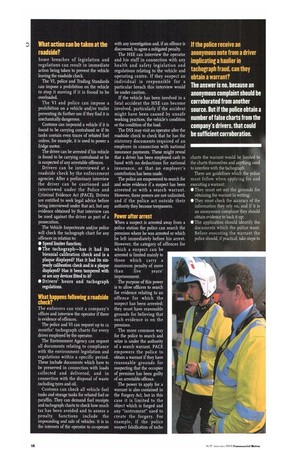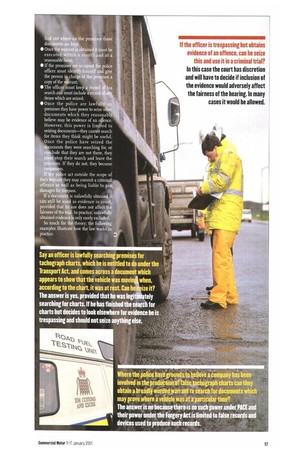Power after arrest
Page 18

Page 19

If you've noticed an error in this article please click here to report it so we can fix it.
When a suspect is arrested away from a police station the police can search the premises where he was arrested or which he left immediately before his arrest. However, the category of offences for which a suspect can be arrested is limited mainly to those which carry a maximum penalty of more than five years' imprisonment.
The purpose of this power is to allow officers to search for evidence relating to an offence for which the suspect has been arrested; they must have reasonable grounds for believing that such evidence is on the premises.
The more common way for the police to search and seize is under the authority of a search warrant. PACE empowers the police to obtain a warrant if they have reasonable grounds for suspecting that the occupier of premises has been guilty of an arrestable offence.
The power to apply for a warrant is also contained in the Forgery Act, but in this case it is limited to the object which is forged and any "instrument" used to create the forgery. For example, if the police suspect falsification of tacho
charts the warrant would be limited to the charts themselves and anything used to interfere with the tachograph.
There are guidelines which the police must follow when applying for and executing a warrant;
• They must set out the grounds for obtaining the warrant in writing; • They must check the accuracy of the information they rely on, and if it is an anonymous complaint they should obtain evidence to back it up;
• The application should identify the documents which the police want. Before executing the warrant the police should, if practical, take steps to
find out where on the premises these documents are kept; • Once the warrant is obtained it must be executed within a month and at a reasonab1(.. hour; • If the premises are occupied the police officer must identify himself and give the person clizIrge of the premises a copy of the rant;
• The offic Must keep a record of his search and must include a record of any items which are seized; • Once the police are lawfullypremises they have power to seize o documents which they reasonab believe may be evidence of an °fence. However, this power is lirritted to seizing documents—they cannot search for items they think might be useful. Once the police have seized the -documents they were searching for, or
c ude that they are not there, they stop their search and leave the
p .,es. If they do not, they become trespa*rs.
If the police act outside the scope of their warrant they may commit a criminal offence as 11 as being liable to pa damages for. pass.
If a docurn t is unlawfully obtained i can still be used as evidence in coin' provided that its use does not affect the fairness of the trial. in practice, unlawfully obtained evidence is only rarely excluded.
So much for the theory; the following examples illustrate how the law works in practice.
































































































